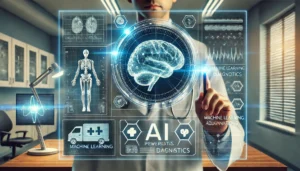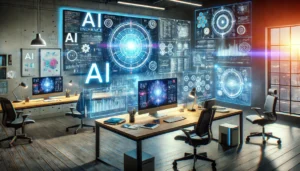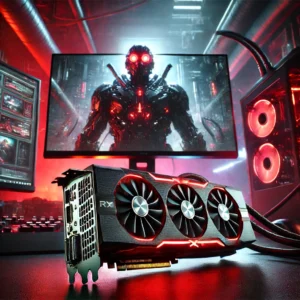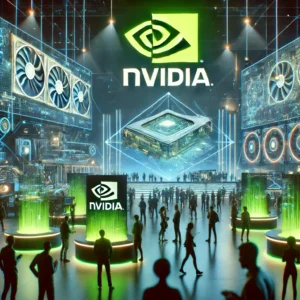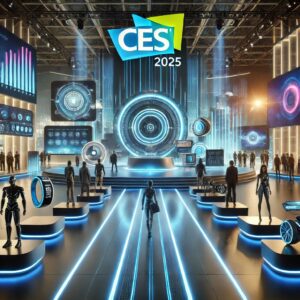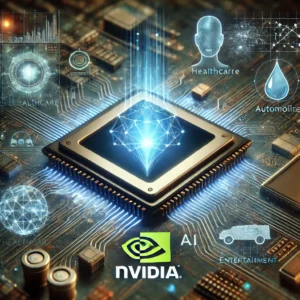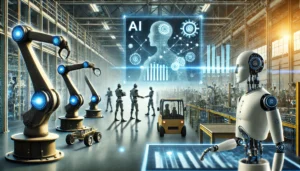Nvidia’s Latest Breakthroughs: Ushering in the Year of AI Agents
Introduction
Nvidia has long been at the forefront of technological innovation, particularly in the realm of artificial intelligence (AI). From the development of powerful GPUs to groundbreaking advancements in AI software, Nvidia has consistently pushed the boundaries of what is possible. In recent years, the emergence of AI agents has marked a significant milestone in AI technology, and Nvidia’s latest breakthroughs are set to make 2025 the year of AI agents. But what exactly are AI agents, and how is Nvidia leading this revolution?
Nvidia’s Journey in AI Innovation
Early Contributions to AI
Development of GPUs
Nvidia’s journey into AI began with its pioneering work in graphics processing units (GPUs). Originally designed to enhance graphics rendering for gaming, GPUs quickly found a new purpose in accelerating AI computations, thanks to their parallel processing capabilities.
Introduction of CUDA
The introduction of CUDA (Compute Unified Device Architecture) in 2006 revolutionized how developers could harness the power of GPUs for general-purpose computing. CUDA enabled more efficient processing of complex AI algorithms, setting the stage for Nvidia’s dominance in the AI hardware space.
Milestones in Deep Learning
Breakthroughs with Neural Networks
Nvidia’s GPUs became indispensable tools for training deep learning models, which require immense computational power. This capability significantly accelerated research in neural networks, leading to breakthroughs in areas like image and speech recognition.
Support for AI Research Communities
Nvidia’s support for AI research communities, through initiatives like the Nvidia Deep Learning Institute, further cemented its role as a leader in AI innovation. By providing resources and training, Nvidia empowered researchers and developers to push AI technology to new heights.
Latest Breakthroughs by Nvidia
Advanced AI Hardware
Nvidia’s New GPU Architectures
Nvidia’s latest GPU architectures, such as Ampere and Hopper, are designed to deliver unprecedented performance for AI workloads. These GPUs are optimized for both training and inference, making them ideal for developing sophisticated AI agents.
Enhancements in Tensor Cores
Enhancements in Tensor Cores, specialized units within Nvidia GPUs, have dramatically increased the efficiency of AI computations. This improvement is crucial for the real-time performance of AI agents, enabling them to process information and make decisions swiftly.
AI Software Innovations
Updates to Nvidia’s SDKs
Nvidia continuously updates its software development kits (SDKs) to provide developers with the tools they need to create cutting-edge AI applications. Recent updates have focused on improving the integration of AI agents into various systems.
Expansion of Nvidia AI platforms
Platforms like Nvidia Clara for healthcare and Nvidia Omniverse for simulation have expanded to include more robust AI agent functionalities, facilitating their deployment in a wide range of industries.
The Rise of AI Agents
Definition and Role of AI Agents
Autonomous Decision-Making
AI agents are systems that can make decisions autonomously, often in complex environments. They are designed to learn from data and interactions, enabling them to perform tasks with minimal human intervention.
Learning from Data and Interactions
Through machine learning algorithms, AI agents improve over time by learning from vast amounts of data and their own experiences. This continuous learning process is fundamental to their ability to adapt and optimize their actions.
Nvidia’s AI Agents in Action
AI Agents in Gaming
In the gaming industry, Nvidia’s AI agents are enhancing player experiences by creating more realistic and challenging non-player characters (NPCs). These agents use AI to adapt to players’ strategies, making games more engaging and immersive.
AI Agents in Autonomous Vehicles
Nvidia’s contributions to autonomous vehicles are perhaps the most notable example of AI agents in action. Nvidia Drive, the company’s AI platform for self-driving cars, leverages AI agents to interpret sensor data, navigate environments, and ensure passenger safety.
Impact on Various Industries
Healthcare Sector
AI Agents in Medical Imaging
In healthcare, Nvidia’s AI agents are transforming medical imaging by improving the accuracy and speed of diagnostic processes. AI-powered imaging tools can detect anomalies with greater precision, aiding in early diagnosis and treatment.
Predictive Healthcare Analytics
AI agents are also being used for predictive healthcare analytics, where they analyze patient data to forecast potential health issues and suggest preventative measures, thus enhancing patient care.
Automotive Industry
AI Agents Driving Autonomous Vehicles
Nvidia’s AI agents play a critical role in the development of autonomous vehicles, handling everything from object recognition to path planning. This technology is paving the way for safer and more efficient transportation.
Enhancing Safety Features
In addition to driving, AI agents are enhancing vehicle safety features, such as automatic braking systems and collision avoidance, making cars smarter and more responsive.
Entertainment and Media
AI-Powered Content Creation
In entertainment, Nvidia’s AI agents are used for content creation, enabling the automatic generation of high-quality graphics, animations, and even entire virtual worlds, reducing production time and costs.
Personalized User Experiences
AI agents analyze user preferences and behaviors to deliver personalized experiences in media consumption, from tailored recommendations on streaming platforms to interactive content that adapts in real-time.
Challenges and Ethical Considerations
Data Privacy Concerns
Handling Sensitive Information
As AI agents become more integrated into our lives, the need to handle sensitive information responsibly becomes paramount. Ensuring data privacy and security is a critical challenge for developers and policymakers alike.
Regulatory Compliance
Compliance with data protection regulations, such as GDPR, is essential for the ethical deployment of AI agents. Nvidia continues to work on solutions that ensure its AI technologies adhere to these standards.
Ethical Use of AI Agents
Ensuring Fairness and Transparency
Fairness and transparency are vital in the deployment of AI agents, especially in decision-making processes that impact individuals and communities. Nvidia is committed to developing AI systems that are unbiased and transparent in their operations.
Mitigating Bias in AI Systems
Bias in AI systems can lead to unfair outcomes. Nvidia actively researches methods to mitigate bias, ensuring that its AI agents operate equitably and inclusively.
Nvidia’s Future Prospects in AI
Ongoing Research and Development
Investments in AI Technology
Nvidia’s investment in AI technology continues to grow, with substantial resources allocated to research and development. This investment ensures that Nvidia remains at the cutting edge of AI innovation.
Collaborations with Academic Institutions
Collaborations with academic institutions worldwide allow Nvidia to stay connected with emerging trends and discoveries in AI research, fostering a continuous exchange of knowledge and ideas.
Predictions for AI Agent Evolution
Enhancing AI Capabilities
The evolution of AI agents will likely involve enhancements in their capabilities, such as improved natural language understanding, greater adaptability, and more intuitive human-AI interactions.
Broader Applications Across Sectors
AI agents are expected to see broader applications across various sectors, including finance, retail, and logistics, where they can optimize operations, enhance customer experiences, and drive innovation.
Conclusion
Nvidia’s latest breakthroughs are set to revolutionize the world of AI agents, positioning the company at the forefront of this exciting technological shift. As we move further into the year of AI agents, Nvidia’s innovations will undoubtedly continue to shape the future, bringing us closer to a world where AI agents are an integral part of our daily lives.
FAQs
What are AI agents?
AI agents are autonomous systems designed to make decisions and perform tasks with minimal human intervention, learning and adapting from data and interactions.
How has Nvidia contributed to AI development?
Nvidia has contributed significantly to AI development through advancements in GPUs, AI platforms, and tools like CUDA, enabling faster and more efficient AI computations.
What industries are most impacted by Nvidia’s AI innovations?
Industries such as healthcare, automotive, and entertainment are significantly impacted by Nvidia’s AI innovations, with applications ranging from medical diagnostics to autonomous vehicles and content creation.
What are the ethical concerns surrounding AI agents?
Ethical concerns surrounding AI agents include data privacy, bias in decision-making, and the need for transparency and fairness in AI operations.
What can we expect from Nvidia in the future?
We can expect Nvidia to continue its leadership in AI, with ongoing research, enhanced AI capabilities, and broader applications of AI agents across various sectors.
Please don’t forget to leave a review.
on Techcyclohub
___________________________________________________________________________________________________
Book Recemendations
Human Compatible: Artificial Intelligence and the Problem of Control” by Stuart Russell
- This book tackles ethical considerations in AI, echoing the challenges and ethical sections of your blog.

